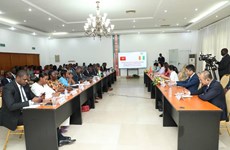Companies told to target BoP market
The "Base of the pyramid" (BoP) consumers, considered the largest,
but poorest socio-economic group, should also be regarded as customers
from a business perspective, and enterprises should focus on this
market.
The "Base of the pyramid" (BoP) consumers, considered the largest,
but poorest socio-economic group, should also be regarded as customers
from a business perspective, and enterprises should focus on this
market.
The statement was made by Curtis Peterson, director of the Pears Programme for Global Innovation of Tel Aviv University, at a seminar held in Hanoi on March 5.
BoP is the socio-economic segment that primarily works and lives in the informal community. The BoP market is the traditional targeted beneficiary of international development efforts.
Peterson said that out of the 6.5 billion global population, 4.9 billion live in the BoP group with an annual income of 3,000 USD. Among them, 3.1 billion earn less than 2.5 USD per day and 1.4 billion earn less than 1.25 USD per day.
In Vietnam alone, he estimated that people earn 2,000 USD per year with an average income of 5 USD per day.
"About a third or half of the Vietnamese people live at the base of the pyramid. With its population of 90 million, the market is large because the BoP group accounts for 39 million," he stated.
The difference between BoP and traditional businesses is of critical value to customers, impacts products and services, and also drives growth in the business.
Peterson emphasised on the importance of partnerships. He said small and medium-sized (SMEs) in Vietnam should partner with other businesses to take advantage of their scale and to expand their business. The enterprises should also provide a high volume of products to sell to the BoP group, because the revenue earned is smaller, he added.
Peterson pointed out that Israel, with its strength of technology, will be willing to support Vietnamese enterprises to develop products for the BoP market.
Luu Duc Khai, Director of the Rural Economic Development Policies Department under the Central Institute for Economic Management, said Vietnam's poverty reduction rate has fallen remarkably, but falls in the same scale in the region.
"The BoP market in every region is not the same. The northern part of Vietnam has the highest number of poor people," he said, suggesting that the government formulate policies to develop microfinance that contributes to reducing poverty and increasing annual income for households through credit provisions.
Khai also said enterprises need to take the lead in terms of technology and market, and share risks with their partners.
The seminar was organised by the Embassy of Israel in Vietnam in cooperation with Vietnam Chamber of Commerce and Industry (VCCI) - Can Tho branch.-VNA
The statement was made by Curtis Peterson, director of the Pears Programme for Global Innovation of Tel Aviv University, at a seminar held in Hanoi on March 5.
BoP is the socio-economic segment that primarily works and lives in the informal community. The BoP market is the traditional targeted beneficiary of international development efforts.
Peterson said that out of the 6.5 billion global population, 4.9 billion live in the BoP group with an annual income of 3,000 USD. Among them, 3.1 billion earn less than 2.5 USD per day and 1.4 billion earn less than 1.25 USD per day.
In Vietnam alone, he estimated that people earn 2,000 USD per year with an average income of 5 USD per day.
"About a third or half of the Vietnamese people live at the base of the pyramid. With its population of 90 million, the market is large because the BoP group accounts for 39 million," he stated.
The difference between BoP and traditional businesses is of critical value to customers, impacts products and services, and also drives growth in the business.
Peterson emphasised on the importance of partnerships. He said small and medium-sized (SMEs) in Vietnam should partner with other businesses to take advantage of their scale and to expand their business. The enterprises should also provide a high volume of products to sell to the BoP group, because the revenue earned is smaller, he added.
Peterson pointed out that Israel, with its strength of technology, will be willing to support Vietnamese enterprises to develop products for the BoP market.
Luu Duc Khai, Director of the Rural Economic Development Policies Department under the Central Institute for Economic Management, said Vietnam's poverty reduction rate has fallen remarkably, but falls in the same scale in the region.
"The BoP market in every region is not the same. The northern part of Vietnam has the highest number of poor people," he said, suggesting that the government formulate policies to develop microfinance that contributes to reducing poverty and increasing annual income for households through credit provisions.
Khai also said enterprises need to take the lead in terms of technology and market, and share risks with their partners.
The seminar was organised by the Embassy of Israel in Vietnam in cooperation with Vietnam Chamber of Commerce and Industry (VCCI) - Can Tho branch.-VNA













